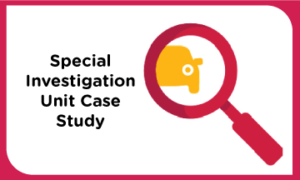According to the National Insurance Crime Bureau (NICB), “more than 1 million vehicles were stolen last year, marking a 7% increase over 2021.” An article from the National Association of Insurance Commissioners (NAIC) states that auto theft fraud costs the insurance industry $7.4 billion each year. Maryland Auto is taking measures to detect and prevent paying fraudulent claims.
This claim begins after an alleged theft of a policyholder’s luxury vehicle. When the claim was reported to Maryland Auto, the policyholder said he had parked his car on the road next to his apartment complex around 9:00 pm, because he did not have a pass for the apartment parking lot. The following day, he noticed the car was missing. The policyholder filed a police report, but police developed no leads to locate the vehicle.
As a part of the theft investigation, Maryland Auto reviewed the history of the stolen vehicle, which revealed that the vehicle had been purchased two years earlier from a private seller for only $500. The policyholder confirmed that he had purchased the car from a private seller around that same time, but claimed to have paid $9,000. He also stated that there was no bill of sale at the time of purchase and that he was only given one key for the car.
The vehicle history report also revealed that the car was a prior salvage and flood vehicle, meaning it was previously declared a total loss due to water damage. A vehicle that is considered salvage would usually have a lower value. When the adjuster disclosed this information to the policyholder, he appeared surprised. Vehicle maintenance records were requested but never received.
A closer examination of the policy revealed that the policyholder had recently added comprehensive coverage at the time of the policy renewal. Comprehensive coverage covers vehicle theft. The Maryland Auto claims adjuster spoke with the insurance agency that sold the policy and confirmed that the policyholder had requested comprehensive coverage for the stolen vehicle during the, although the policyholder had policies in force for multiple vehicle, the stolen vehicle was the only one included in the request to add comprehensive coverage. This raised concerns with our adjuster.
Maryland Auto also obtained access to the stolen vehicle’s key and had it evaluated by a local dealership. The dealership determined that the key had not been updated or used in over a year. This raised suspicions further and led Maryland Auto to believe that another key may be available, especially since the policyholder had claimed to have been driving the vehicle immediately before its theft.
Due to the concerns associated with this claim, Maryland Auto obtained an Examination Under Oath from the policyholder. Although his story remained the same as before, he could not explain why the information discovered through the key technology contradicted his statement about vehicle use and, ultimately, the theft of the vehicle.
The claim was denied and referred to the Insurance Fraud Division of the Maryland Insurance Administration for questionable facts and lack of evidence that a theft occurred.




